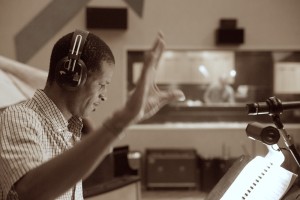
If you’re a fan of new music, be it “indie-classical” or whatever it’s being labeled this week, then you must check out the music of composer and conductor Joseph C. Phillips, Jr. Phillips’ music, composed and arranged for his ensemble Numinous, a large chamber group (or small orchestra?) of woodwinds, brass, strings, tuned percussion, electric instruments and vocalists, is a complex, finely detailed amalgam of classical, minimalist, South American, Asian, and African American influences, with a distinctive “sound” that is instantly identifiable, yet full of surprises. (You know those descriptive terms “Brahmsian” or “the Mingus effect”? It’s like that.) Phillips’ latest album, Changing Same, due out August 28 on New Amsterdam Records, is perhaps his most autobiographical musical statement to date.
While his previous recordings, Numinous: The Music of Joseph C. Phillips, Jr. and Vipassana include notes that detail the inspiration for his compositions, Changing Same has no notes; just a quote from 1966 by writer, poet and playwright Amiri Baraka (then Le Roi Jones) that describes a “post-black aesthetic,” one that unapologetically digs both the down-home and the downtown, the highfalutin and the funky, the Anglo-centric and the Afro-futuristic, the “what it is” and the “what the hell is goin’ on?” The titles for each of the six movements of Changing Same offer some additional clues . . . “Behold, the Only Thing Greater Than Yourself,” “Miserere,” “Unlimited,” “Alpha Man,” “The Most Beautiful Magic.” The first track, “19,” which can be streamed and purchased here, refers to November 19, 1970, the date of the publication of James Baldwin’s essay, “An Open Letter to My Sister, Miss Angela Davis,” Arnold Schoenberg’s Sechs Kleine Klavierstücke, opus 19, from 1911, and the age Phillips began studying music as an undergrad, after two semesters as a bio-chemistry major.
Changing Same is another intriguing chapter in Phillips’ journey, from growing up listening to both Holst and Prince, to conducting Numinous onstage at the Brooklyn Academy of Music in a performance of his score for the 1922 silent film The Loves of Pharoah, to producing this latest release. In the following interview, Phillips provides some details about that journey, and explains how his life experience, be it past, future or present-day-craziness, is reflected in the music of Changing Same.
On the back of your new album, there’s a quote by Amiri Baraka (then LeRoi Jones) from his 1966 essay, The Changing Same:
“R&B is about emotion, issues purely out of emotion. New Black Music is also about emotion, but from a different place, and finally toward a different end. What these musicians feel is a more complete existence. That is, the digging of everything.”
So, my first question with regard to this quote is, do you dig everything?
Well, of course, I have my standards. [laughs] There are things I like and don’t like.
In that essay, Baraka is explaining the spontaneous compositional processes of the creative improvisational people at that time, and putting them in a continuum of what had come before in terms of black music. He’s saying look, these guys might seem like they’re acting wild and crazy, But really, this “New Black Music” harkens back to earlier music.
When I read the essay, the quote just jumped out at me. I thought it was a perfect encapsulation of what I’m doing or hoping to have happen with my piece. With Changing Same, I wanted to take the cultural and musical things that I grew up with and incorporate them into piece. When I read Baraka’s essay, I thought, yes, I grew up with the black music continuum, Marvin Gaye, Curtis Mayfield, and Prince. But I grew up with classical music as well, like Holst, Bach . . . like any other composer, I have a potpourri of influences. Sometimes you can hear these influences very specifically. For example, on the fourth track, “The Most Beautiful Magic,” the initial bass line is actually coming straight from Prince’s “Purple Rain.”